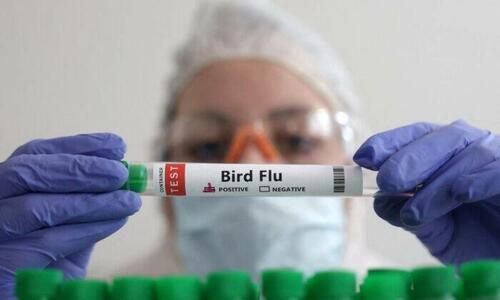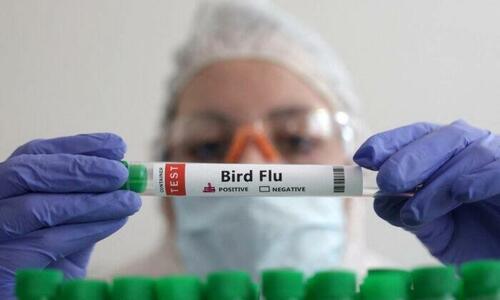Bird Flu Virus Mutations Discovered In First Severe Human Case In US, CDC Says
Authored by Katabella Roberts via The Epoch Times (emphasis ours),
The U.S. Centers for Disease Control and Prevention has found mutations in samples taken from a man infected with the first severe case of avian influenza in the United States, mutations that were not present in specimens collected from his infected backyard flock.

The agency began analyzing the samples after the patient—a resident of southwestern Louisiana, aged over 65—was confirmed last week as the first person in the United States with a severe case of H5N1 bird flu.
In a Dec. 18 statement, the CDC said the man was infected with the D1.1 genotype of the virus that was recently detected in wild birds and poultry in the United States, and in human cases in British Columbia, Canada, and Washington state.
The strain differs from the B3.13 genotype detected in dairy cows, human cases, and some poultry across the United States.
According to a Dec. 26 update from the agency, an analysis of two respiratory specimens collected from the man showed low-frequency mutations in the hemagglutinin (HA) gene, the part of the virus that plays a key role in its binding to host cells.
The mutations were not found in poultry samples collected on the patient’s property, suggesting the changes emerged in the patient after he became infected, the CDC said.
According to the CDC, the mutations seen in the samples may result in increased virus binding to cell receptors found in the upper respiratory tract of humans.
“Although concerning, and a reminder that A(H5N1) viruses can develop changes during the clinical course of a human infection, these changes would be more concerning if found in animal hosts or in early stages of infection (e.g., within a few days of symptom onset) when these changes might be more likely to facilitate spread to close contacts,” the CDC stated. “Notably, in this case, no transmission from the patient in Louisiana to other persons has been identified.”
Risk to Public Remains Low: CDC
While the mutations are rare, they have been reported in some cases in other countries and most often during severe infections.
One of the mutations was also identified in another severe human case in British Columbia, suggesting it emerged as the virus replicated in the patient, the agency said.
Despite the discovery of the mutations, the CDC said the risk to the general public remains low.
The detection of a severe human case of bird flu with genetic changes in a clinical specimen “underscores the importance of ongoing genomic surveillance in people and animals,” the agency said.
It also highlights the importance of containing bid flu outbreaks among dairy cattle and poultry and implementing prevention measures among people exposed to infected animals or environments, the CDC said.
A total of 65 human cases of H5 bird flu have been reported in the United States since April 2024, according to the CDC.
To help prevent exposure, health officials have urged people to avoid direct contact with sick or dead animals, particularly wild birds and poultry, and to wear personal protective equipment if contact is unavoidable.
The agency also advises people not to touch surfaces or materials contaminated with the saliva, mucous, or animal feces of wild or domestic birds or other animals that may be infected with the virus.
Reuters contributed to this report.
Tyler Durden
Fri, 12/27/2024 – 18:05

